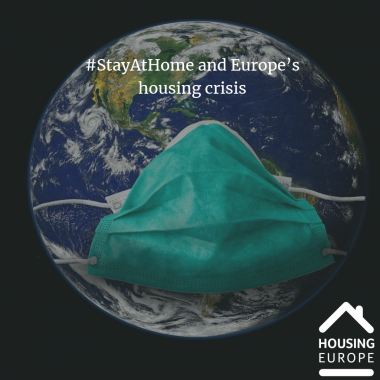
Housing Europe: a position paper: The COVID-19 pandemic exposes the shortcomings of our housing policies
 Public, cooperative and social housing providers are mobilising to protect vulnerable people and the local economy in this time of crisis. Strong public support for essential services; housing, health, education, transport from governments and international bodies now more vital than ever.
Public, cooperative and social housing providers are mobilising to protect vulnerable people and the local economy in this time of crisis. Strong public support for essential services; housing, health, education, transport from governments and international bodies now more vital than ever.#StayAtHome, #ZuHauseBleiben, #ResterChezVous, #RestateACasa, #QuédateEnCasa #MenoumeSpiti… the language is not so important, but the message is clear. Citizens around the globe are ordered, requested or recommended to stay at home- depending on the level of the measures taken by each government- contributing thus to the universal effort to flatten the curve of the COVID-19 spread. Confinement and social distancing are considered by most national authorities and by the EU Institutions as an effective way in getting this extraordinary global health crisis under control. Such a decision to implement a lockdown, keeping people at home, surely has multiple consequences but also brings to the surface, once again, Europe’s housing crisis.
Concretely, #StayAtHome is easier said than done for a very large part of the EU population:
- The European Foundation for the Improvement of Living and Working Conditions (EUROFOUND) highlighted already in 2016 that “Inadequacies…. still affect a substantial proportion of the population in most Member States. Some inadequacies, such as lack of indoor sanitary facilities, are close to non-existent in some countries while affecting up to a fifth of the population in others.” EUROFOUND also calculated that the annual total cost to the economies of the EU of leaving people living in inadequate housing is nearly €194 billion.
- Eurostat has been warning that in 2017, over 15 % of the EU population lived in overcrowded dwellings; the highest rate among the Member States was in Romania (47%).
- Looking at EU SILC data, our Observatory highlighted in its relevant briefing that on average 4 out of 10 people on low incomes aged between 16 and 29 in the EU live in a situation of overcrowding.
- Housing Europe’s ‘The State of Housing in the EU 2019’ report shed light once again to the alarming trend one can observe in housing-related expenditure. 37.8% of households at risk of poverty spend over 40% of their disposable income on housing . At the same time, when housing costs are taken into account, 156 million people are at risk of poverty, as against 85 million before housing costs are taken into account (EU SILC).
- The European Federation of National Organisations Working with the Homeless FEANTSA pointed out that “Staying Home” is definitely not an option for over 700,000 people across Europe experiencing homelessness.
- According to EU Energy Poverty Observatory estimations more than 50 million households in the European Union are experiencing energy poverty.
Housing Europe President, Cédric Van Styvendael stresses that:
“Anyone can easily understand that within this housing crisis that Europe has been confronted with for many years now, asking people to stay at home is far from than simple for many of them. We are proud that our sector plays the role of a much-needed safety net during this pandemic, while we also add our voice to international calls to stop evictions anywhere for any reason. More than ever, we are mobilized to make access to decent and affordable housing an essential right. We strongly believe that Europe’s Green Deal must be a social one and must imperatively integrate the challenge of reviving the production of social housing to accompany the unprecedented crisis we are facing.”
The UN Special Rapporteur on Adequate Housing, Leilani Farha urged on March 18th governments around the world not to allow any evictions, anywhere for any reason as “housing is the front line defence against the COVID-19 outbreak”.
COVID-19 and the public, cooperative & social housing sector
Within this new global reality that impacts directly and hits hard the everyday work of public, cooperative and social housing providers, they are the safety net that millions of people around Europe desperately need at the moment. Below, we put together an overview of the actions taken so far to deal with these tough circumstances:
GdW, the Federal Association of Housing and Real Estate Companies, the umbrella organization of the relevant sectors in Germany along with their real estate sector partners issued a joint statement, stressing how coordinated partnerships are now more vital than ever. They have also called together with the Tenants’ Union for the introduction of “Secure housing funds” in times of crisis. Tenants who are not able to pay their rent or part of it due to COVID-19, should be eligible to apply for support on this new online platform that will be set up.
The Italian Cooperative Housing sector proposed exceptional preventative measures to support low income families paying their rent. In this difficult moment Legacoop Abitanti, one of the Italian Associations of Housing Cooperatives, expressed solidarity towards the most affected people and gratitude to those offering their commitment, including the Social Cooperation sector that has been close to the most vulnerable also during this state of emergency.
The Inhabitants Cooperation is playing its role at the service of the members, keeping some essential services and activating new forms of community resilience, which represents a distinctive sign of our history. #IoRestoaCasa (#WeStayAtHome) truly underlines the HOME question, and the need to re-think it. From an economic point of view, Legacoop Abitanti believes that the impact of the COVID-19 crisis will lead to further difficulties for vulnerable families to pay the rent, causing a very negative social effect in the medium term.
Legacoop Abitanti, through its President Rossana Zaccaria, expresses a positive evaluation about the effort of the Italian Decree “Cura Italia”, in order to face the public health emergency and to preserve both families’ and workers’ safety. However, concerning the Home question, the Decree provided measures referring exclusively to the mortgages (Art. 54) and the suspension of evictions until 30 June 2020 (Art 103, Paragraph 6). Legacoop Abitanti, together with the Alliance of Italian Cooperatives – Housing sector, proposes exceptional measures to support low-income tenants who will struggle in paying rents. Concretely, with an amendment to Art. 54 at the “Cura Italia” decree, they propose an increase of 50 million Euros of the existing “Fondo per morosità incolpevole” (Fund for tenants arrears – due to loss of income ) for year 2020: this can be done with a specific additional spending chapter, with an extension of the pool of the beneficiaries, including families renting both social housing and cooperative undivided property dwellings, since these perform a welfare function allowing the access to the renting market. This provision shall be a preventative measure, using the same operating procedures as for the management of the Fund, therefore with the immediate disbursement of the contribution directly to the landlords in order to avoid eviction procedures – a condition provided by the current mechanisms – for a maximum period of 6 months and covering 70% of the total amount of the rent and related costs. Legacoop truly believes that now the containment of the increase of social fragility is necessary, maintaining access to housing as an essential hub of welfare and community resilience.
Community Housing Cymru in Wales published a guide for housing associations coping with Coronavirus (COVID-19), which is continuously updated. From advice on managing availability of supplies to essential services to flexibility in grant & funding processes.
Union Sociale pour l’ Habitat in France issued a statement on the introduction of organizational measures to allow the seamless continuity of the service, announcing to examine the personal situations of tenants and delivery of customized support, likewise rental evictions are postponed. They have also published a Crisis Management Coronavirus Dossier for their members briefing on how to stay informed and communicate and continue support and care activities.
The National Housing Federation in England stressed in their press statement that ‘’No one should lose their home because of coronavirus’’
The Austrian Federation of Limited-Profit Housing Associations (GBV) urges members to follow a full stop on evictions and rent arrears.
Our Swedish cooperative member HSB shared their own coronavirus-related recommendations calling for coordination between housing associations and state responses.
Guidance and advice for the members of the Irish Council for Social Housing (ICSH) includes an extensive list of related resources.
Both in Ireland, according to the ICSH, and in Spain, according to AVS, rents will be adapted automatically based on income.
AVS believes that, now more than ever, having a large stock of public, social, and affordable housing, with professional and specialized providers, will be key to prevent thousands of families from being at risk of losing their homes. AVS sends a message of tranquility to the thousands of families who live for rent in the houses of the public park. Its members are taking measures in favour of tenants who have had a significant reduction in their income, due to the state of emergency in Spain.
In the Netherlands, the Association of Dutch Social Housing Companies, Aedes advised its members (managing more than 1/3 of the total housing stock in the country) to seek solutions for tenants who experience payment difficulties as a result of the corona crisis, to avoid evictions and to allow construction and maintenance activities to continue as much as possible, but only if health is guaranteed.
Macroeconomic responses and the housing dimension
The European Central Bank has announced a €750bn bond-buying programme. The central bank said all the extra asset purchases would be carried out this year and cover both sovereign bonds and corporate debt. This so-called Pandemic Emergency Purchase Programme will last until the coronavirus crisis is judged to be over. For the purchases of public sector securities, the benchmark allocation across jurisdictions will continue to be the capital key of the national central banks. The Governing Council of the ECB committed to support all citizens of the euro area through this extremely challenging time, ensuring that all sectors of the economy can benefit from supportive financing conditions that enable them to absorb this shock. This applies equally to families, firms, banks and governments.
The European Commission agreed to loosen the State Aid rules, enabling Member States to be more flexible and effective in their support measures. The new Temporary Framework will enable Member States to (i) set up schemes direct grants (or tax advantages) up to €500,000 to a company, (ii) give subsidised State guarantees on bank loans, (iii) enable public and private loans with subsidised interest rates. Finally (iv), the new Temporary Framework will recognise the important role of the banking sector to deal with the economic effects of the COVID-19 outbreak, namely to channel aid to final customers, in particular small and medium-sized enterprises. The Temporary Framework makes clear that such aid is direct aid to the banks’ customers, not to the banks themselves. And it gives guidance on how to minimise any undue residual aid to the banks in line with EU rules.
Finally, the Eurogroup (ministers of the euro area member states) acknowledged in its statement the need for flexibility in the Stability and Growth Pact “to cater for unusual events outside the control of governments”.
This newly introduced flexibility is welcomed but must be extended to essential services such as housing providers whose value to society is clearer than ever at this time of crisis.
